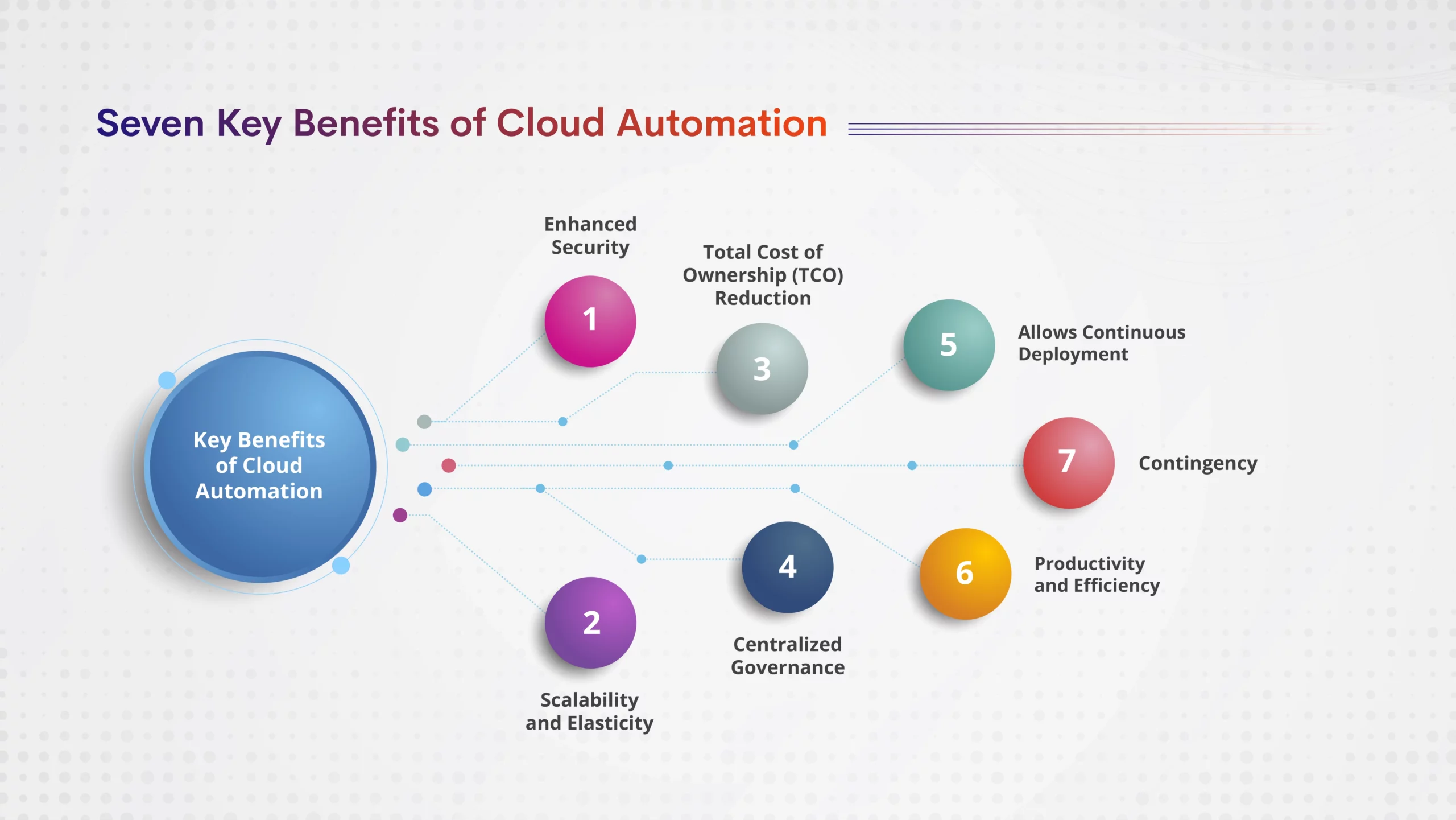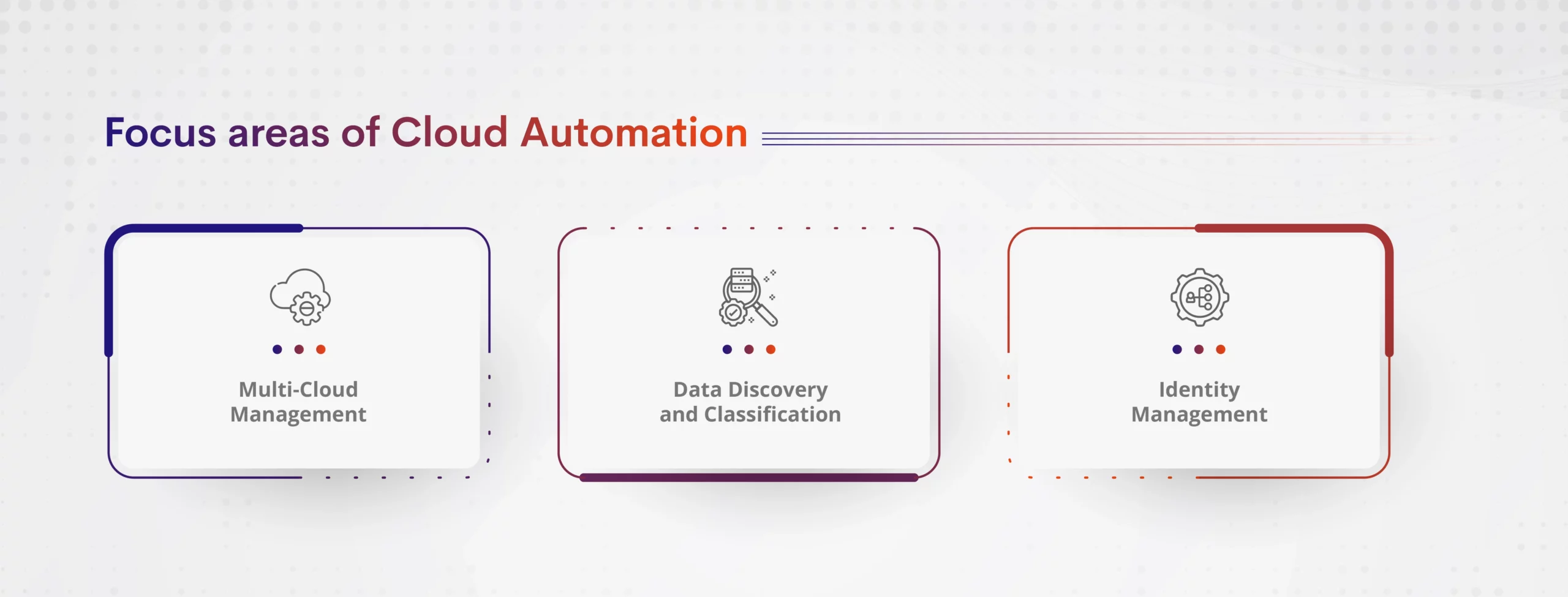- Blog
- December 8, 2022
Seven key benefits and focus areas of Cloud Automation

- Blog
- December 8, 2022
Seven key benefits and focus areas of Cloud Automation
It would not be wrong to say that the creation of the cloud is one of the biggest advent in the age of digital revolution; it has essentially altered how we store and process information. Since its origin, cloud computing has transformed business enterprises across the world.
Nothing is permanent but change and same goes for cloud. Cloud computing is at an exciting new turn in its journey. Cloud automation is an innovative development that will transform businesses in the upcoming years. In essence, cloud automation is a set of tools, keys, and processes for managing cloud services to ease manual efforts on repetitive time-consuming tasks.
The cloud computing business is here to stay and rise steadily, surely and certainly. It is estimated that the public cloud market will be a $623.3 billion industry by 2023. On an average upto 30% of the IT budget is allocated to cloud services. It is predicted that by 2025 worldwide cloud storage will reach 100 Zettabytes. 84% of the organizations that adopted cloud automation have increased their revenue and reduced operational costs.
Key Benefits of Cloud Automation
All this data clearly indicates that enterprises should opt for cloud automation. But, the million-dollar question is, how can it help industries in their day-to-day operations? In this blog article, we will explore the benefits you can reap from cloud automation. Let’s look at seven key benefits of cloud automation.

- Enhanced Security
- Scalability and Elasticity
- Total Cost of Ownership (TCO) Reduction
- Centralized Governance
- Allows Continuous Deployment
- Productivity and Efficiency
- Contingency
One of the major reasons organizations deter in cloud adoption is security. With cloud automation, you can remove human intervention, which means rarer manual errors that compromise security. When you invest in automation, there’s no requirement for multiple individuals working on the same system. It will also contribute to robust safety policies as access to the system will be selective.
Any business that needs to scale up its infrastructure often due to consumer demands should definitely invest in cloud automation services. Managing cloud services manually in its nascent stages is a possibility, however, managing terabytes of data in thousands of virtual machines turns out to be a tad bit complicated at an enterprise level. This is where automation comes in handy.
TCO is a crucial parameter that regulates the success of a business. If your TCO is high, you’re not making as much profit with because of expenditure on resources. You can significantly reduce your TCO by opting for cloud automation. From hardware costs to human resources required to maintain them, cloud automation can help free your resources to do so much more.
Numerous people are involved in managing your cloud services manually or on an ad-hoc basis. In this environment, you don’t have total autonomy over the proceedings, and holding anyone accountable for any error is a pain. Evolving to automation would leave no scope for doubt as it provides you with centralized governance. You are in absolute control of infrastructure, empowering you to make informed business decisions.
CI/CD (Continuous Integration/Continuous Deployment) and DevOps are the norm processes today. Continuous deployment is only a possibility when you are automating your application workflow pipeline. Cloud automation is the key to continuous deployment.
One of the prime reasons you should adopt cloud automation is to generate higher operational efficiency. While it may take hundreds of days to complete a task manually, the same can be achieved within a few minutes with the help of automation.
Enterprises deal with a lot of data — it’s the new currency. Backup is an absolutely critical component of today’s business environment. With cloud automation services, you don’t have to bother about backups. It automatically takes care of it recurrently throughout the day and saves you from losing out on valuable data in an event of system failure. With corporate owners having so much on their plate, automation makes their work more manageable than ever before.
Focus areas of Cloud Automation
So what’s the best way to harness the phenomenon that is cloud automation? There are various ways and means which can help you reap optimum benefits from cloud automation. Let’s have a look.

- Multi-Cloud Management
Multi-cloud is a concept where you combine multiple public or private clouds to achieve better productivity for your business operations. Multi-cloud management is where cloud automation has a substantial role to play. Working with multiple clouds can be a tedious task. These operations and workflows can be easily streamlined between multiple clouds with the help of automation.
- Data Discovery and Classification
Cloud automation tools and services can aid enterprises in ensuring GDPR compliance by scanning and classifying sensitive information. Data discovery and classification require a tenuous amount of effort, however with automation this becomes an absolute breeze.
- Identity Management
In an enterprise, there are many users accessing the central server, and each requires a specific level of access. Setting up identity management policies manually for users takes a lot of time and effort. Updating these policies whenever needed is also extremely cumbersome. In this scenario, automation is the key to a smooth and seamless functioning.
Final Thought
All new technology evolves with time, and so is the case with cloud computing. Cloud automation is a game changer when it comes to productivity, efficiency, scalability and elasticity. It is bound to play a massive role in workflow transformation at all levels of your business.
Curious to know how you can leverage the force that is cloud automation. At MSRcosmos we have masters of the game customizing the best cloud automation plans just for you. Get in touch with us today.



